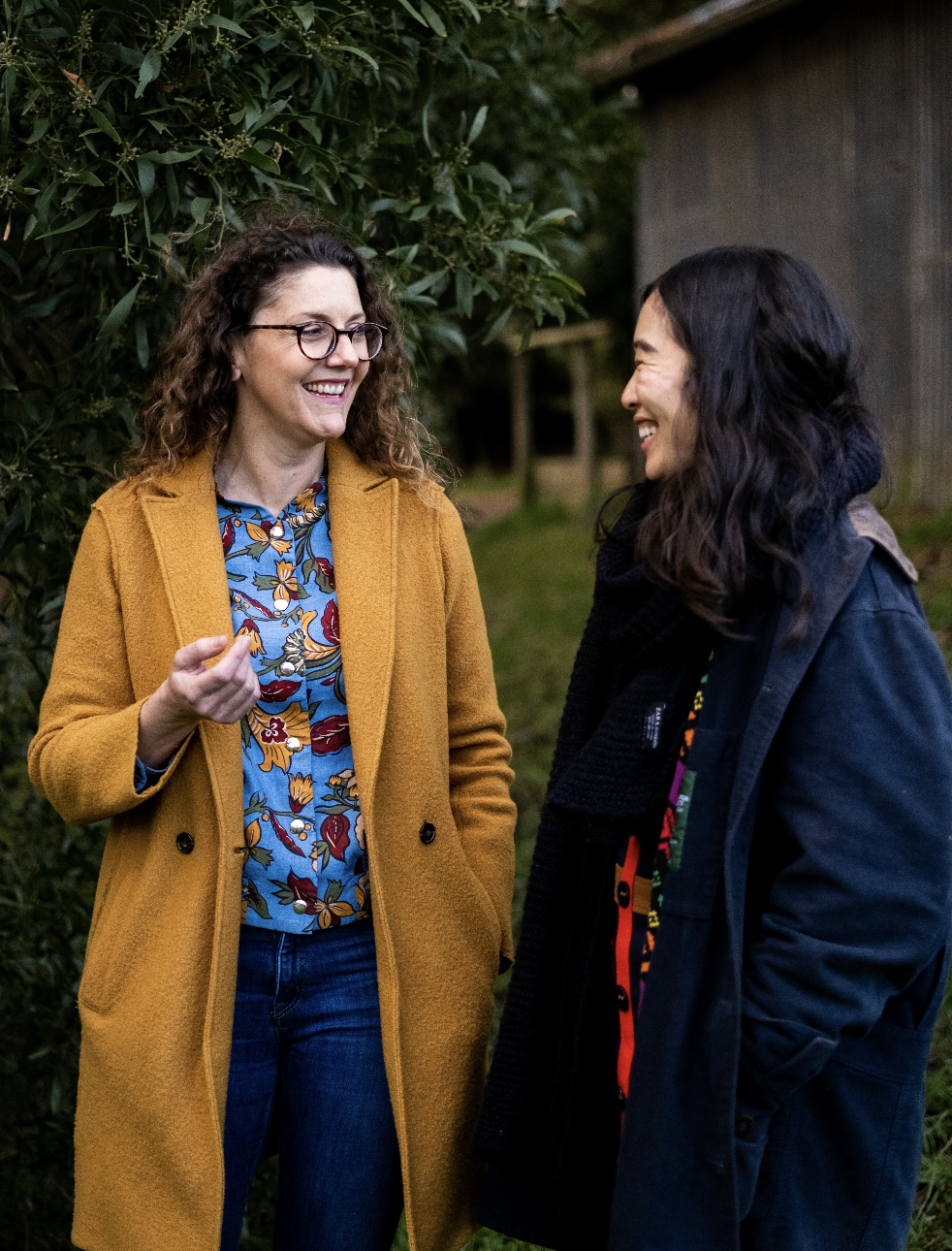Revolutionise your governance with both rigour and strategic purpose.

Modern governance demands more than compliance. It requires the strategic vision to navigate emerging risks, engage stakeholders effectively and, crucially, align performance with purpose.
Through this comprehensive program, you'll gain both the essential foundations of organisational governance and the strategic frameworks to lead with purpose.
Governing for Purpose delivers the rigour of traditional governance training while adding the critical perspectives needed for today's complex business landscape — elevating purpose and stakeholders as central to good decision-making.
Have questions about the program? Book a call with our team here.
Our curriculum builds on essential foundations of governance and compliance, then extends to leading practices — integrating stakeholders, protecting purpose and leading systems change.
Each participant has the opportunity to assess their personal boardroom effectiveness, culminating in an individualised Board Development Plan aligned to your specific organisational context and governance challenges.
Have questions about the program? Book a call with our team here.


Governing for Purpose is tailored to board members and directors who need both technical governance expertise and strategic vision to lead effectively in today's complex business environment.
The program delivers practical governance training for participants across industries and sectors, including:
If you're looking for governance training that goes beyond compliance to deliver genuine strategic value, reach out to our programs team to discuss how Governing for Purpose aligns with your professional development needs.

Governing for Purpose provides a comprehensive governance framework, combining essentials with strategic vision and insight to help you develop your Next Economy Board Development Plan. We'll cover a broad range of topics, including:
Download the brochure to explore the full program:

We offer flexible pricing structures to support different individual contexts. Please get in touch with us to discuss pricing further - you can book a call with our team here.

— Gayle Hardie, Global Leadership Foundation
.png)
Apply to secure your place in the program, or reach out to chat to our programs team about how Governing for Purpose can enhance your leadership - you can book a call with our team here.

We’re proud to be a supporting Creative Australia as a training provider for the Company Director Capability Fund, providing governance training for both individuals and organisations in the arts and cultural sector.
This initiative is designed to grow diverse, purpose-led leadership by offering:
$3,000 for individuals (artists and arts workers under-represented on boards)
$6,000 for organisations to build internal governance capacity
Participants can choose from a range of courses that build core skills in governance, financial management, strategy, and ethical leadership. At Small Giants Academy, our offering focuses on values-based, regenerative governance that supports systems change.
Together, we’re helping shape a creative sector where boards reflect the full diversity, talent and vision of our communities.
If you are interested in this opportunity, find out more here.
Governing for Purpose is facilitated by the Small Giants Academy, led by Mele-Ane Havea, Chair of B Lab Australia And Francie Doolan, CIO, Small Giants. The program draws on a global network of guest speakers and case-studies presented by leading organisations.
Yes, although not in the traditional sense! Participants will take part in mini-projects and reflections within each module, as well as some longer projects that last across the breadth of the program. Participants will also be asked to peer-assess work delivered by their peers. Active participation in the peer-assessment process will form part of the overall assessment.
For dates and timetables compatible with your location, please sign up to the Small Giants Academy newsletter to be the first to know of new timetables and locations.
Active participation throughout the program, including attendance at sessions, and completion of reflection exercises and project work, will result in successful graduation.
The emphasis of our program is on peer-to-peer learning. Our time together will also include guest faculty sessions, case studies and group work. Participants can expect an immersive, participatory and peer-to-peer driven experience.
Our time together will include guest speaker sessions, case studies and group work. Participants can expect an immersive, participatory and peer-to-peer driven experience. As such, participation at each weekly session is required. We do not have a minimum rate of participation as such, and of program, life sometimes gets in the way! Some sessions will be recorded for catch-up viewing, however, regular participation is expected.
Yes. Prior to each module there will be some pre-reading required and projects and reflections will be completed outside our contact hours. We estimate between 2-3 hours of additional study time per week.
This governance program is a non-accredited program and does not result in the award of a qualification recognised with the Australian Qualifications Framework. it is your responsibility to ensure that the Governance program meets your requirements and has the expected recognition outcome prior to enrolment.
All of our programs note ‘continuing professional development hours and you will receive a certificate upon completion. Continuing Professional Development hours are a guide only and participants should contact their respective professional membership organisations for guidance.
General Admission: $4,500 + GST, B Corps Concession: $4,050 + GST NFPs, Registered Charities, and First Nations People $3,600 + GST
As part of our blended delivery program, we will be gathering for a three-day in-person intensive which will run from 11-13 May 2026 in St Kilda, Victoria.
Governing for Purpose is facilitated by the Small Giants Academy, led by Mele-Ane Havea, Chair of B Lab Australia And Francie Doolan, CIO, Small Giants. The program draws on a global network of guest speakers and case-studies presented by leading organisations.
Yes, although not in the traditional sense! Participants will take part in mini-projects and reflections within each module, as well as some longer projects that last across the breadth of the program. Participants will also be asked to peer-assess work delivered by their peers. Active participation in the peer-assessment process will form part of the overall assessment.
For dates and timetables compatible with your location, please sign up to the Small Giants Academy newsletter to be the first to know of new timetables and locations.
Active participation throughout the program, including attendance at sessions, and completion of reflection exercises and project work, will result in successful graduation.
The emphasis of our program is on peer-to-peer learning. Our time together will also include guest faculty sessions, case studies and group work. Participants can expect an immersive, participatory and peer-to-peer driven experience.
Our time together will include guest speaker sessions, case studies and group work. Participants can expect an immersive, participatory and peer-to-peer driven experience. As such, participation at each weekly session is required. We do not have a minimum rate of participation as such, and of program, life sometimes gets in the way! Some sessions will be recorded for catch-up viewing, however, regular participation is expected.
Yes. Prior to each module there will be some pre-reading required and projects and reflections will be completed outside our contact hours. We estimate between 2-3 hours of additional study time per week.
This governance program is a non-accredited program and does not result in the award of a qualification recognised with the Australian Qualifications Framework. it is your responsibility to ensure that the Governance program meets your requirements and has the expected recognition outcome prior to enrolment.
All of our programs note ‘continuing professional development hours and you will receive a certificate upon completion. Continuing Professional Development hours are a guide only and participants should contact their respective professional membership organisations for guidance.
General Admission: $4,500 + GST, B Corps Concession: $4,050 + GST NFPs, Registered Charities, and First Nations People $3,600 + GST
As part of our blended delivery program, we will be gathering for a three-day in-person intensive which will run from 11-13 May 2026 in St Kilda, Victoria.